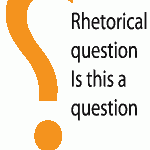 A great technique that is often used when giving presentations is to first ask a rhetorical question to introduce an emphatic statement.
A great technique that is often used when giving presentations is to first ask a rhetorical question to introduce an emphatic statement.
for example :
So, just how big IS the market?
…………..eNORmous.
* Notice how the adjective in the question is reinforced with a stronger adjective in the answer. Notice also how the verb and strong adjective are stressed.
Exercise One:
Match the rhetorical question on the left with their one-word answers on the right:
1. So, just how bad IS the situation? a ….. POsitive.
2. So, just how difficult IS it? b ….. unPREcedented.
3. So, just how competitive ARE we? c. ….. specTAcular
4. So, just how sure AM I that we can do it? d. ….. imPOssible.
5. So, just how good ARE the results? e. ….. STATE-of-the-ART.
6. So, just how unusual IS the trend? f. …..unBEAtable.
7. So, just how small IS the risk? g. …..cataSTROphic.
8. So, just how new IS this technology? h. ….. NEgligible.
Can you notice the placement of word stress in both the questions and the answers? It’s an important point and well worth practising.
Extra question: How many adjectives above can be preceded by:
b. practically?
Exercise Two:
Now take a look at this pattern:
So, just how bad is the situation?
> I’ll tell you how bad it is. It’s absolutely catastrophic!
So, just how difficult is it?
> I’ll tell you how difficult it is. It’s practically impossible.
Notice how the second sentence reinforces the rhetorical question. Reinforce the other rhetorical questions in Exercise One in the same way.
According to scientists and scientific studies carried out on the effects and influence of Rhetorical Questions, the following has been observed:
Four experiments were conducted examining the effects of asking rhetorical questions on message processing and persuasion utilizing a radio commercial. Subjects exposed to questions were compared to other subjects exposed to content-equivalent statements across different message positions. The expectations of two different theoretical models of question effects are contrasted and compared. The results of all four experiments are consistent with the view that rhetorical questions elicit judgments on the topic of the request when they are received and that the availability of relevant information when a judgment is first requested is a critical factor determining whether or not message persuasion occurs. The pattern of results predicted by viewing rhetorical questions as elicitors of judgments is differentiated from previous views.
Learning a foreign language ( English for example) is not just about how to speak that language, but HOW to USE it. In professional life this is an all important factor in using the English language.
Good luck with your English language learning.
Simon
Ok English



